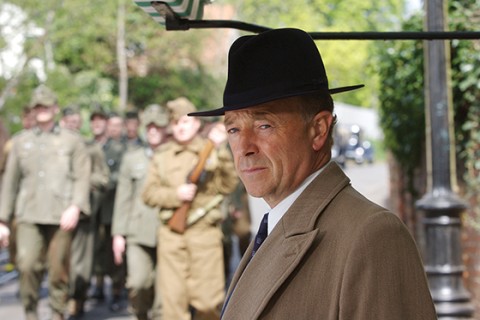Crimes on the home front

I’ve been obsessively watching Foyle’s War, a British detective series that takes place on the home front while World War II rages on the continent. The show started in 2002 and will offer a ninth season in 2015 (the eight previous seasons are available on Netflix).
Christopher Foyle (Michael Kitchen) is the detective chief superintendent responsible for investigating crimes in Hastings, a town on Britain’s southern coast (almost half of its 65,000 residents were evacuated in 1940). The show explores crimes made possible by the war. In one episode, a fire brigade responding to enemy bombing is stealing items from victims’ homes. In another, a secret government weapons program goes awry and officials cover up the release of toxic chemicals in the countryside. The series punctures the myth of the “good war” by showing that while the lads were off doing their bit, others were doing for themselves.
Read our latest issue or browse back issues.
The show has a rhythm: Foyle has to solve the case, get someone he cares about off the hook, and restore justice to Hastings and to the war effort. He inevitably succeeds, usually giving a rousing speech about how he solved the case while the culprits express amazement and sometimes remorse. The moral formula is as satisfying as the cinematographic one.
Foyle is understated, humble, patriotic, and smart—not manic-genius smart, like Sherlock, but hardworking gumshoe smart. He notices things others miss, reads motives, and knows when he has sufficient evidence and when he doesn’t. He coaxes a confession out of a criminal in one scene and casts a beautiful fly at his favorite fishing spot in the next. He has a deep sense of right and wrong and somehow manages not to be made cynical by the moral outrages that he witnesses.
The contemporary relevance of the show hinges on the fact that the war is sometimes cited as a reason for letting injustice triumph. A criminal must be let go or the war effort will be hurt. A company had to commit illegal acts to make sure the Jerries don’t win. These arguments are used to shield the fact that those with corporate, military, or government power are simply using that power to personal advantage. Foyle won’t stand for it.
An episode in season six has a character based on Anglican bishop George Bell, who risked charges of treason by arguing against the indiscriminate bombing of German civilians after the war had turned in the Allies’ favor. The bishop gives an impressive theological defense of just war and against firebombing, even citing Bonhoeffer. We now know about hundreds of thousands of civilian casualties in places like Dresden, and in retrospect we’re inclined to sympathize with the German civilians in the show. But as soon as we do, new evidence emerges that changes the situation. Bishop Bell may have been right, but the show keeps the moral complexity alive.
I love how the show portrays Brits’ pluck in the face of Nazi power, their ability to joke in the midst of despair. I want a Christopher Foyle in my corner who can see all and, with barely a twitch of the side of his mouth, can tell us the precise truth about the world. But are there really people like Foyle?
Maybe my hope is too anemic. In the real world there was a German POW in Britain named Jürgen Moltmann. Local British families were inviting prisoners for a meal and hospitality, and Frank Baker, one of Methodism’s greatest historians, invited Moltmann to his home. Moltmann relearned the Christian faith at his enemy’s table. “The seed of hope was planted in my heart in the home of Frank Baker.”
Perhaps real hope is even more outlandish than Inspector Foyle’s moral certitude.





